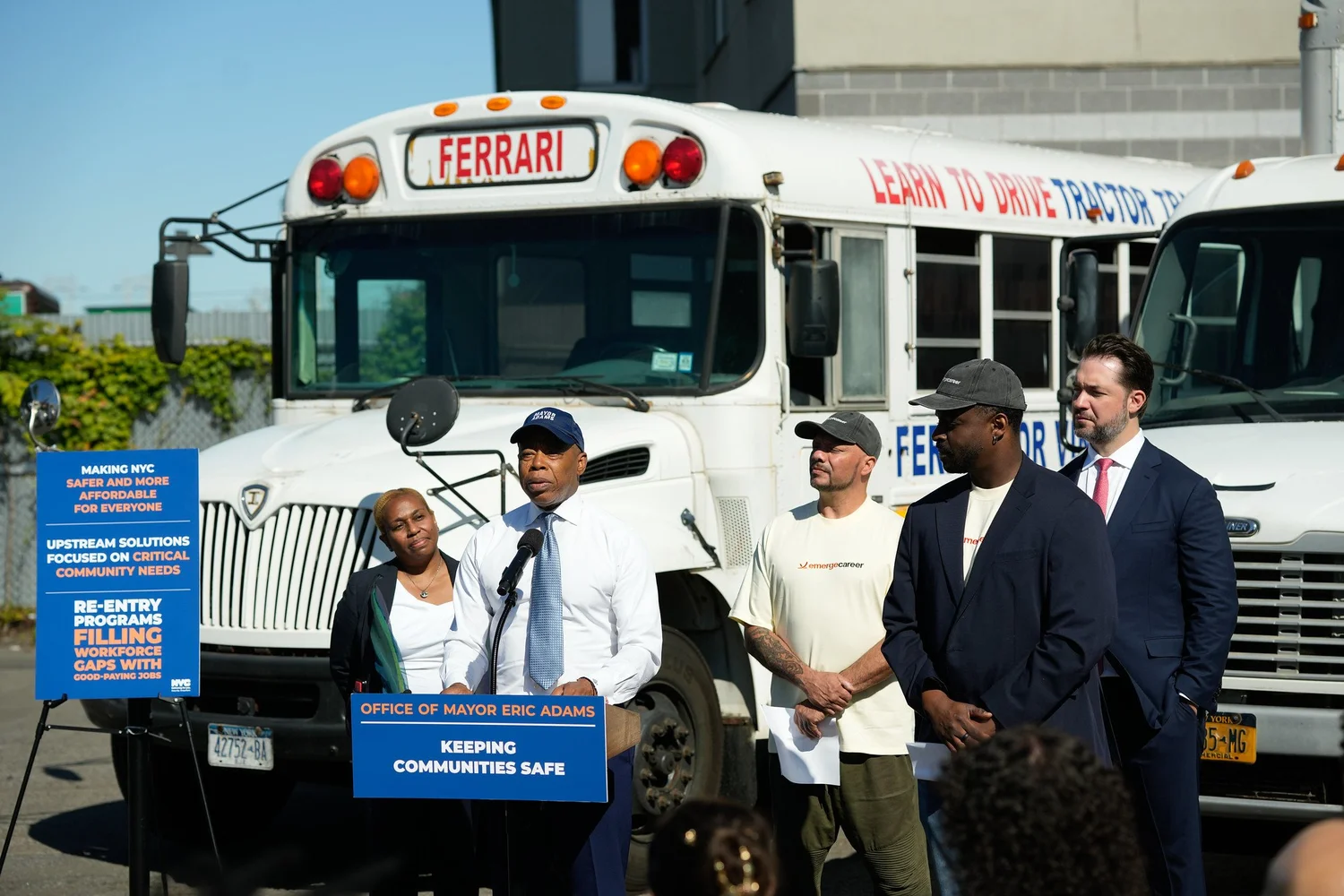By Jacob Kaye
Mayor Eric Adams this week expanded a successful jobs program for formerly incarcerated New Yorkers – but the expansion comes as lawmakers and advocates question the mayor’s commitment to funding social services programs aimed at lowering the city’s incarcerated population, and to the closure of Rikers Island, which is years behind schedule.
The Adams administration said on Wednesday from Astoria that it would be expanding its Commercial Driver’s License training program for justice-involved individuals, which aims to create employment opportunities for formerly incarcerated New Yorkers and lower the city’s recidivism rate. According to Adams and the Mayor’s Office of Criminal Justice, which administers the program, the initial pilot of the program, which was rolled out earlier this year, has proven to be a success – all 20 of the program’s initial participants secured a full-time CDL job offer after finishing the training.
After serving less than two dozen people during the program’s rollout, the city will bring 300 people into the truck-driving program as part of the expansion in 2026.
“One mistake should not destroy a person’s life because a bend in the road should not be the end of a road,” Adams said in a statement. “Today, we are driving second chances in New York City by expanding our Commercial Driver’s License training program.”
“By providing upstream solutions to downstream problems, we are shifting up a gear to prevent recidivism, keep our city safe, and put justice-involved New Yorkers on a path to build their American Dream in the greatest city in the world,” he added.
According to the mayor’s office, the program addresses two major needs – financial stability for formerly incarcerated New Yorkers and filling workforce gaps in an industry facing significant labor shortages.
Across the country, the unemployment rate for Americans after being released from jail or prison is 60 percent, which is 12 times higher than the national average. With all 20 of the program’s first participants securing jobs with starting salaries between $78,000 and $124,800, the city said they’ve been able to buck the trend.
“Research has taught us that one of the easiest ways to improve community safety is to help New Yorkers find financial stability,” said MOCJ Director Deanna Logan. “The data is also showing us that our investments…are paying immense dividends, in real second chances and wealth creation for some of our city’s most disadvantaged communities.”
The pilot has also earned support from prosecutors, including Queens District Attorney Melinda Katz, who in a statement that “[s]ecuring a job is key to avoiding recidivism.”
“The city’s commercial driver’s license training program has proven to be a success in providing employment opportunities for formerly incarcerated individuals,” she said. “I thank Mayor Adams for expanding this valuable program that will provide gainful employment opportunities for those reentering the workforce.”
The expansion of the licensing program comes as the future of the city’s criminal justice apparatus is in question.
City law mandates Rikers Island be shuttered by August 2027, but the city has fallen so far behind on its timeline to close the troubled jail complex that meeting the deadline appears nearly impossible.
None of the four borough-based jails set to replace Rikers are near completion and all four won’t be finished until at least four years after the closure deadline.
Much of the blame has been cast on the Adams administration. While the mayor has said the pandemic was responsible for delays to construction of the new jails, the mayor has also cut a number of social services programs and increased arrests, which has led to swelling population on Rikers Island.
While the new jails are going to be built with the capacity to hold around 4,400 people, the current population in the jails is far larger. As of July, there were over 7,600 people incarcerated on Rikers, the largest population housed in the jail since 2019.
The population has increased nearly every month since Adams first took office.
Criminal justice advocates and lawmakers in the City Council, who are overwhelmingly in favor of shutting Rikers, have said the mayor hasn’t done enough to lower the population.
After years of cutting social services that experts say help reduce crime and recidivism, the mayor agreed to make a number of investments in diversion programs in the most recent city budget this year, including funding for the CDL training program.
Also worked into the budget was $7.6 million to fund alternatives to incarceration services and $6.5 million for re-entry services, indigent defense, supervised release and other programming that was previously funded with pandemic stimulus dollars.
But the city has been slow to pay out.
Earlier this month, the City Council, led by Council Speaker Adrienne Adams, rallied to call on the mayor to implement the programs funded in the budget. They also called on the mayor to prioritize the opening of hundreds of hospital jail beds, which, like the borough-based jails, are years behind schedule.
A spokesperson for the City Council told the Eagle on Thursday that “[w]hile the mayor’s announcement today is a positive step towards progress, the Council continues to call on his administration to take immediate action to urgently and appropriately implement the over $50 million in new funding for mental health and safety programs, so all New Yorkers can be healthy and safe.”
Adams’ announcement also comes days before a federal judge will begin considering candidates to take over major aspects of the jail system’s management after finding last year that the city had failed to make Rikers safe for detainees and staff over the past 10 years.
The receiver will assume many powers currently given to the Department of Correction commissioner and the mayor for an undetermined amount of time and will be answerable only to the judge.
